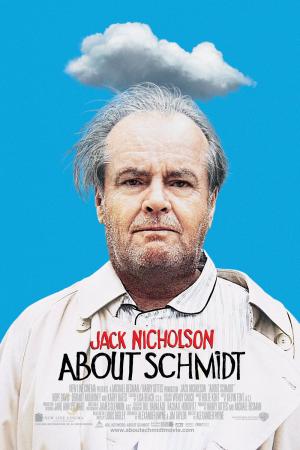About Schmidt
 for some language and brief nudity.
for some language and brief nudity.
Reviewed by: Halyna Barannik
CONTRIBUTOR
| Moral Rating: | Very Offensive |
| Moviemaking Quality: |
|
| Primary Audience: | Adults |
| Genre: | Drama |
| Length: | 2 hr. 4 min. |
| Year of Release: | 2002 |
| USA Release: |
December 30, 2002 |



| Featuring |
|---|
|
Jack Nicholson Hope Davis Dermot Mulroney Kathy Bates Howard Hesseman |
| Director |
|
Alexander Payne |
| Producer |
|
Harry Gittes Michael Besman |
| Distributor |
“About Schmidt” is a pleasingly original approach to the topic of retirement. Warren Schmidt (Jack Nicholson) retires and then has to face the rest of his life. The movie depicts a fairly short span of time, maybe a month or less, focusing on the actual retirement/party, the new life without the job as an executive with an insurance company, the sudden death of his spouse, and the marriage of his daughter and only child.
The loneliness that Warren feels is palpable. In a surprising twist to the story line, Warren signs up to be a foster parent to a child in Africa, and writes letters to the little boy, in which he completely inappropriately expresses all his innermost thoughts and feelings and new experiences. The letters contribute to the film’s narrative. They are touching and funny.
After his wife’s sudden death, Warren travels in a motor home to attend his daughter’s wedding. His daughter Joanie (Hope Davis) is marrying Randall (Dermot Mulroney), a waterbed salesman. Randall’s mother (Kathy Bates) hosts Warren to dinner and a hot tub. Intertwined with all the activity that pertains to the retirement, the wedding, the meeting with Randall’s family, is the drama of Warren Schmidt trying to cope with all his many losses and changes. Nicholson deftly portrays a man struggling to do right by everyone. Despite the unfortunate fact that his daughter is living with her fiance, and Randall’s mother is quite raunchy and lewd in word and manner, “About Schmidt” is not very offensive for the mature Christian audience. Despite his moment of weakness when he makes a sexual advance to a married woman, Warren Schmidt is a basically decent man, at least the way Nicholson plays him. The screenplay is a sensitive one which offsets the worldly society in which the movie is set.
This film is a thought-provoking drama that captures the shock of retirement. It has some very funny moments. A brief nude scene with Kathy Bates and some profanity justify the R-rating.
- Violence: Men fight
- Profane language: • Chr*st (1) • J*sus (2) • G*d-damn (6) • D*mn (1)
- Vulgar/Crude language: • F-word (5) • A**hole (1)
- Nudity: Brief female breast nudity
- Sex: • Explicit sex references • Woman talks about her sex life being very active and how horny she is • Kissing • Man touches woman’s breast (clothed) • Nude drawings of women (brief) • Discussion of a daughter’s sex life
Discussion
- When life is lived without significant love, it is not difficult to understand the emptiness of the heart. But if we know this, then why do so many of us choose to live lives consumed with other goals and pseudo-purposes? Why do we not all change the course of our lives to reach our true destinations?
- When we miss the opportunity to be loving parents when our children are young and then attempt to reconnect with them later in life, why is that connection so difficult? Surely Jeannie wanted a father as much as Schmidt wanted to be a father, especially now with her mother’s death, but why did she reject him so quickly? What was the meaning of the look she had after her father gave his toast? What do you think she expected him to do?
- When Schmidt did the simplest of Christian acts, that of adopting a starving child for $22 per month, his soul was enlivened. What do you believe would happen to him if he were to experience first-hand the loving community of church life and reached out to the many children needing the love of a father figure?
- If psychologists like Erikson identify the purpose of life as being one of increasing love and care for others, why do so many of our cultural signals tell us to sacrifice relationships and family to “get ahead” financially and professionally? What have we failed to bring into our culture to make loving relationships a cultural norm?


[Better than Average / 5]
Moral rating: Average / Moviemaking quality: 4
[Average / 3]
[Extremely Offensive / 3]

 Discover God’s promise for all people—told beautifully and clearly from the beginning. Discover The HOPE! Watch it on Christian Answers
Discover God’s promise for all people—told beautifully and clearly from the beginning. Discover The HOPE! Watch it on Christian Answers
This is easily one of Nicholson’s best performances (his second best, in my opinion; Ironweed being his first). Schmidt goes through the entire spectrum of emotions throughout the film, ranging from bored to desperate to hopeful to regretful, and Nicholson (who has far more acting skill than people give him credit for) pulls each off perfectly. It doesn’t take long for us to forget that we are not watching Nicholson, but just a sad, discontented old man. The film does have some cursing in it, as well as some very unexpected nudity. Apart from that, the film is a stunning example that, if one really tries, it’s never too late to make a difference.
My Ratings: [Average / 4]